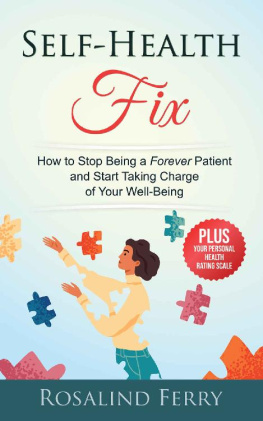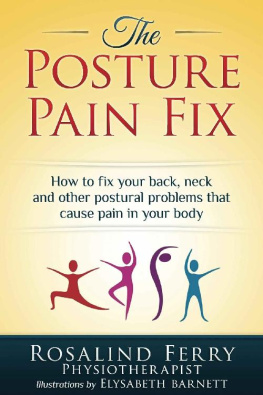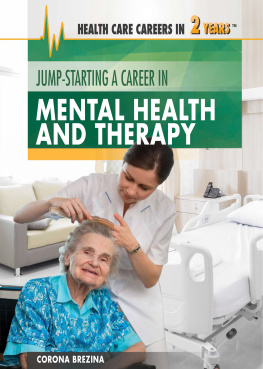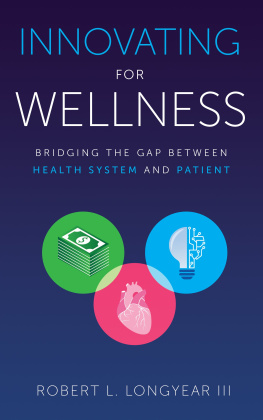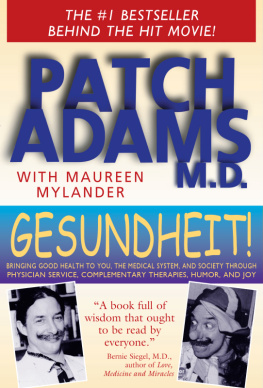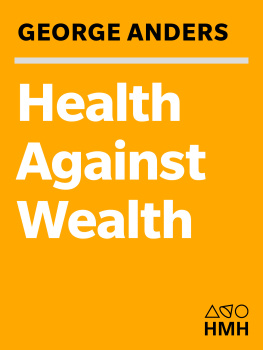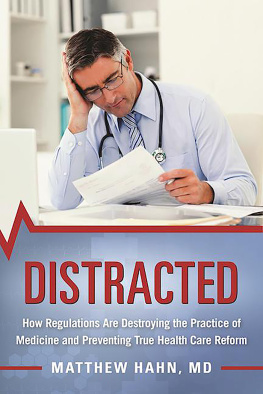

Copyright 2021 Rosalind Ferry
www.rosalindferry.com
ISBN 978-1-9991414-3-1 (paperback)
ISBN 978-1-9991414-4-8 (ebook)
All rights reserved. No part of this book may be reproduced in any form or by any electronic or mechanical means, including information storage and retrieval systems, without permission in writing from the author.
Always check with a health care professional before beginning any exercise program.
The information in this book is true and complete to the best of my knowledge. All recommendations are made without guarantee on the part of the author. She is offering general information and knowledge to be used at your discretion on your journey toward better health and, therefore, disclaims all liability in connection with the use of this information.
Names and certain details of actual patients have been altered to protect their identity.
Editor, Nina Shoroplovaninashoroplova.ca
Book Interior and eBook Design, Amit Dey
Publishing Consultant, Geoff Affleck
To my dearest mother, Pat, a wonderful nurse and listener who inspired me to overcome my health issues and taught me that we humans have more power to heal ourselves than we think.
Contents
I would like to thank my generous husband, Jon, and my wonderful son, Will, for encouraging me to write this book and helping me with editing and technical support. I could not have done this without you both.
Many thanks to Geoff Affleck, book entrepreneur extraordinaire, whose patience and skill guided me smoothly through the complex production and marketing process.
Thanks to Nina Shoroplova for her masterful editing, patience, and kindness.
And thanks to all the amazing patients I have had the pleasure of working with through the years. I have learned so much from you all, and hope your stories will help others find solutions to their health problems.
Thanks to the doctors and other health professionals who entrusted me with the care of their patients. And a special thanks to Anniken Chadwick, the physiotherapist who contributed a valuable chapter to this book.
My gratitude also goes to long-time friend Jane Morgan, a true warrior. Her story is an inspiration to us all.
Finally, I would like to acknowledge my beautiful, spirited grandchildren, Georgia and Julian, whose creative talents give me hope for a better, healthier world.
W hen it comes to their health, some patients seem to be forever patients. They never appear to recover fully or think that this is even possible.
They have lost faith in their bodys ability to heal, and expect little from the health system... so little that they are content if it simply gives them a Band-Aid.
I vividly remember returning to work at a British Columbia hospital out-patient clinic and being shocked to see several patients I had treated seven years earlierfor the same conditions.
I thought then, as I do now, that many of them had been programmed to remain victims of their own low expectations.
My motivation in writing this book is a growing belief that we cannot depend on the overworked health system alone for an improvement in our well-being. We must learn to care for our own bodies and have a plan for keeping them in tip-top shape, just as we would our finances and friendships.
Instead, too many of us seem to believe that, because of bad luck or poor genetics, we are locked into a state of perpetual sub-par existence, supported by the medical system.
Many health professionals, too, appear content for this dependency to continue. Or at least they seem to feel they dont have the time to discuss the fullest possible range of treatment options, including those that put patients in charge of their own health.
My research for this book started with my own hands-on experience as a physiotherapist, treating a wide range of patients in both hospital and private practice in Britain and Canada for more than forty years.
My study mushroomed with the work for my book The Posture Pain Fix, a step-by-step guide to help people ease their neck, back, and other body-alignment problems. And I have supplemented that research with my reading on everything from homeopathy and holistic healing to Pilates, the Feldenkrais Method, and other physical fitness and therapy systems.
Self-care isnt a new concept. Greek philosopher Socrates stressed its importance in the fifth century BCE, and everyone from the Persian poet Rumi in the thirteenth century to British political theorist John Locke in the seventeenth century have continued to do so.
Today, doctors and health systems managers on the front lines in the battle against COVID-19 invoke self-cares efficacy.
As Washington, DC, internal medicine specialist Manisha Singal, MD, stated, I make it a point to practise self-care. In fact, I make an appointment with myself. I spend this time to meditate and affirm three things that Im grateful for that day.
I, too, make regular appointments with myself. And I hope this book will help encourage you to do so too.
Note: In the context of my having worked as a physiotherapist, I occasionally refer to myself as a physio and my practice as a physio clinic.

Trusting Your Gut
A few years ago, I was going home from work after a busy day at my North Vancouver physiotherapy clinic. It was a ten-minute walk alongside a saltwater inlet ringed by mountains and forests. A man slowly drew up beside me in his truck, stopped, and said, Youd better get in my vehicle... theres a bear on the street.
This middle-aged man was a stranger. I looked at him, thanked him, and told him Id be okay. He drove off, leaving me to proceed with caution. And, sure enough, there was a black bear in the bushes beside the road.
I continued home calmly, but was ready to react. The bear continued on its way, too. Having grown up in Africa around wild animals, I believed I had the confidence to navigate around them with quiet, alert energy, knowing full well they could be unpredictable.
In other words, I made a split-second decision to take my chances with a bear rather than getting into an automobile with a man I knew nothing about. For some people, though, the decision might have been the exact opposite.
So, the question arises, whom do you really trust? Perhaps close friends and relatives. Or maybe just yourself. In which case, developing self-reliance skills is essential.
However, knowing when to rely on yourself and when its best to seek professional medical help often is not a simple decision. People tend either to go to the doctor at the first tickle of the throat... or wait until they are in the middle of a stroke or heart attack. Mothers and wives will know what Im talking about.
My son joined us for breakfast the other morning. It was a warm, humid day and he said he was feeling weak and very tired. My immediate reaction was Oh, no, its the coronavirus.
He felt hot, clammy, and tired. I took his temperature, and it was normal. He had no dry cough, no chest pain or trouble breathing, and no scratchy throat (all possible COVID-19 symptoms). This was a relief for us all.
Then, I remembered our son had gone on an intense, hour-long mountain-bike ride the previous evening. And he acknowledged he had been sweating a lot without taking in regular fluids.
Next page
